Unit 1 Where did you go on vacation Section A 重要知识考点+练习过关(含答案)
文档属性
| 名称 | Unit 1 Where did you go on vacation Section A 重要知识考点+练习过关(含答案) | 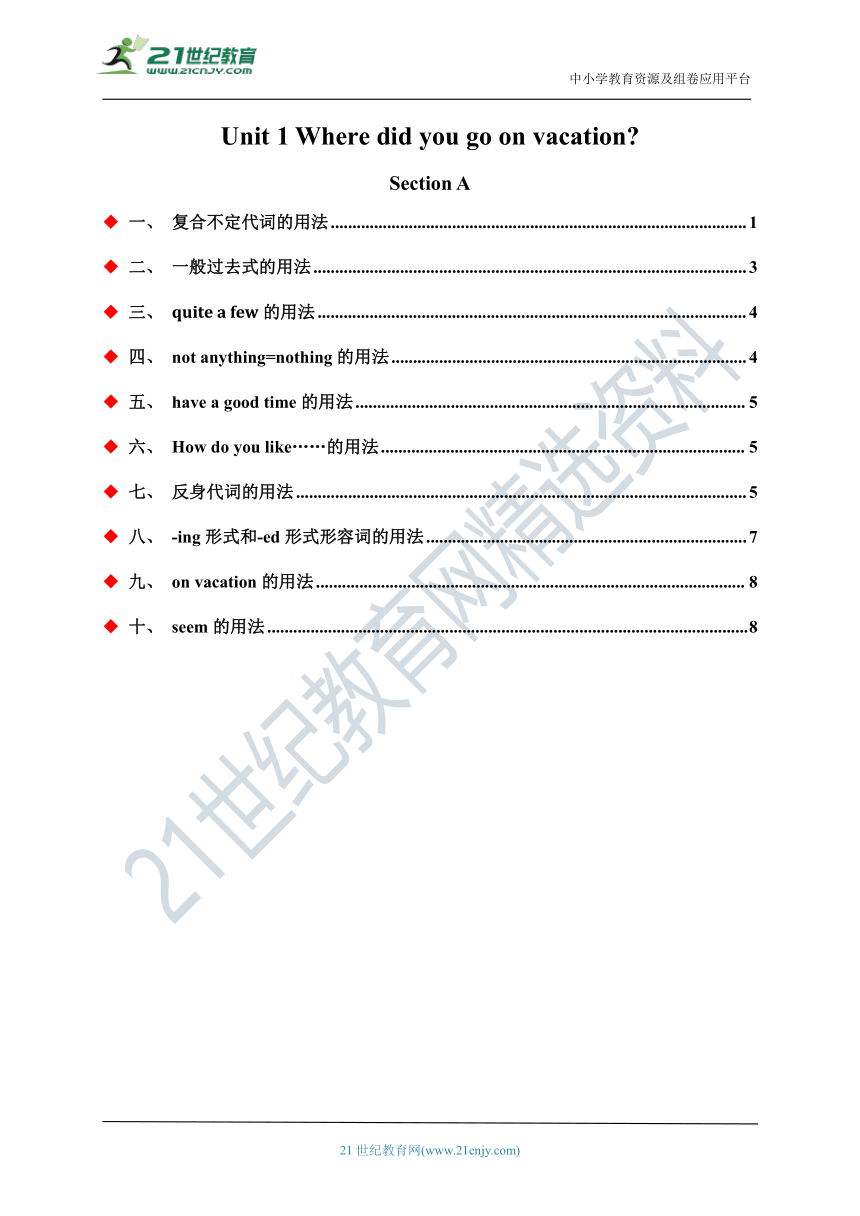 | |
| 格式 | docx | ||
| 文件大小 | 1011.5KB | ||
| 资源类型 | 试卷 | ||
| 版本资源 | 人教新目标(Go for it)版 | ||
| 科目 | 英语 | ||
| 更新时间 | 2021-09-13 15:04:35 | ||
图片预览

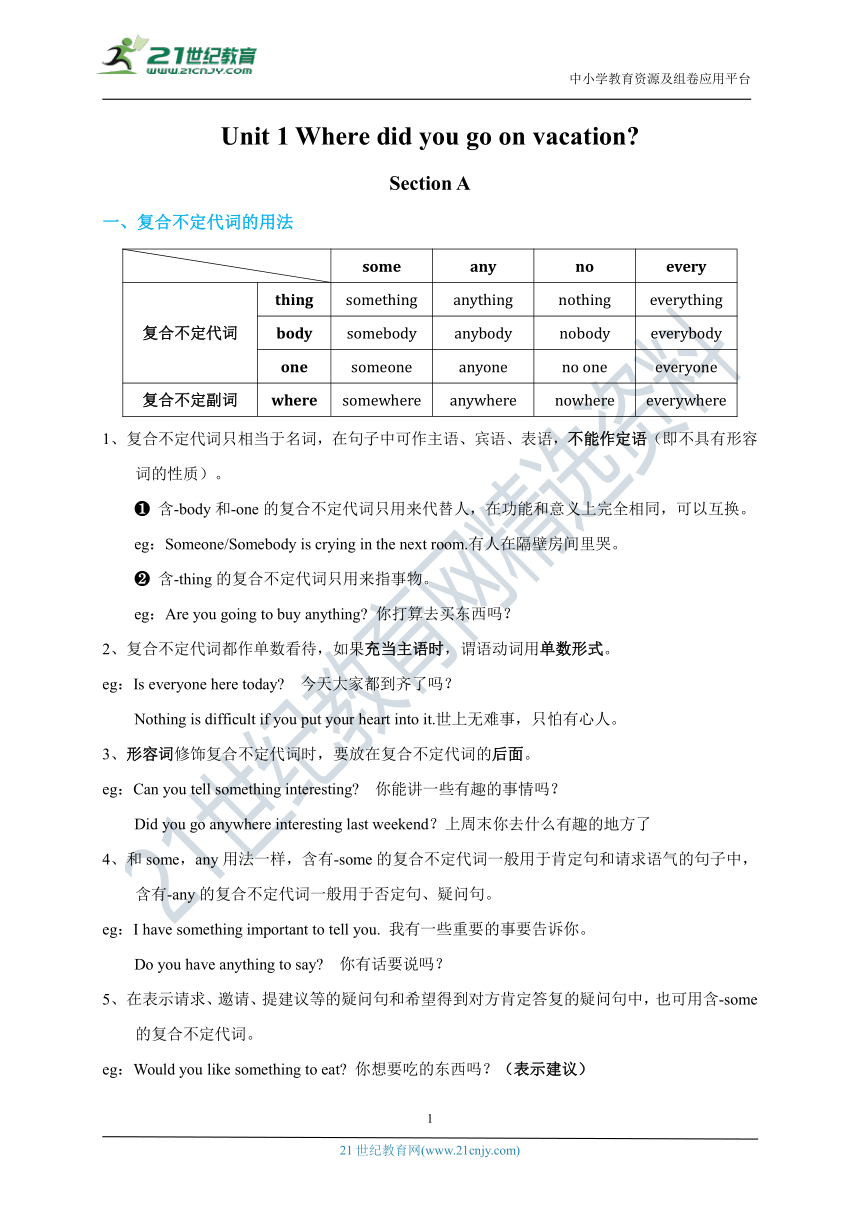
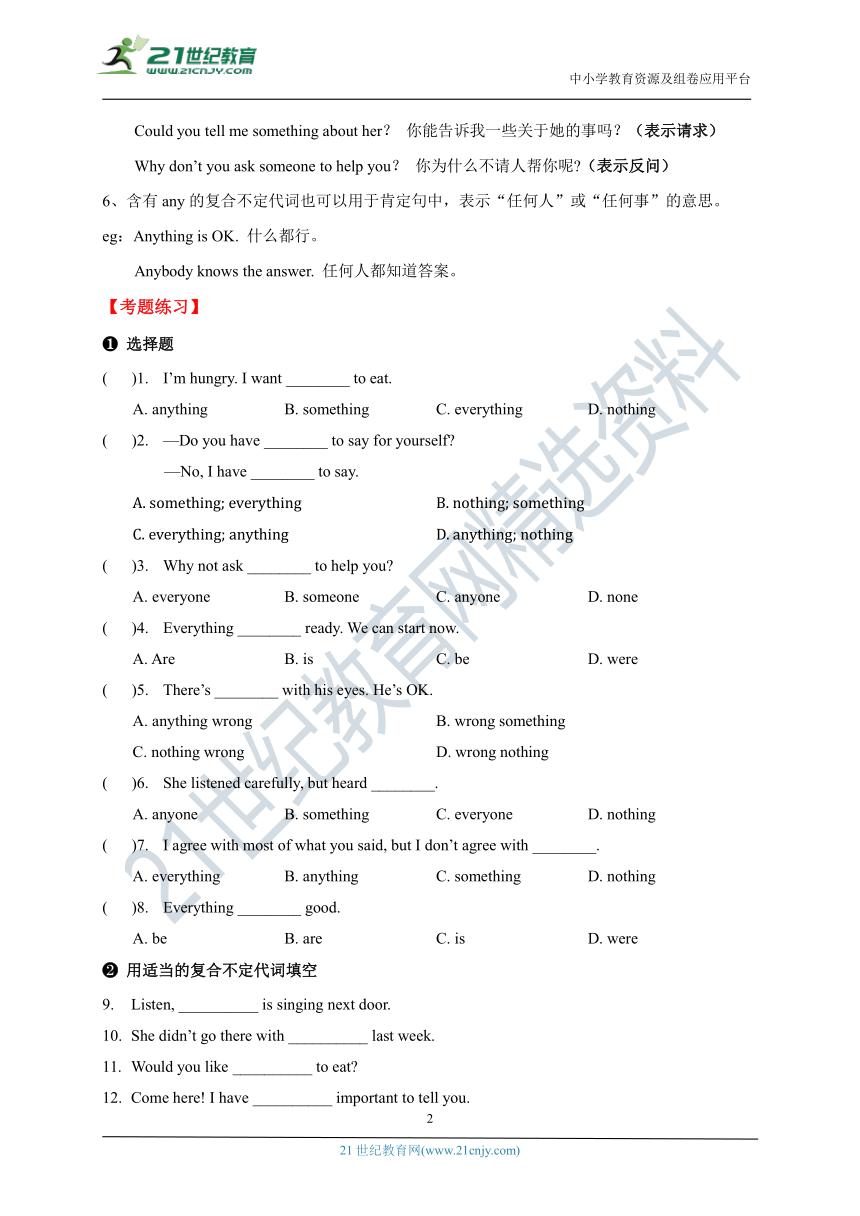
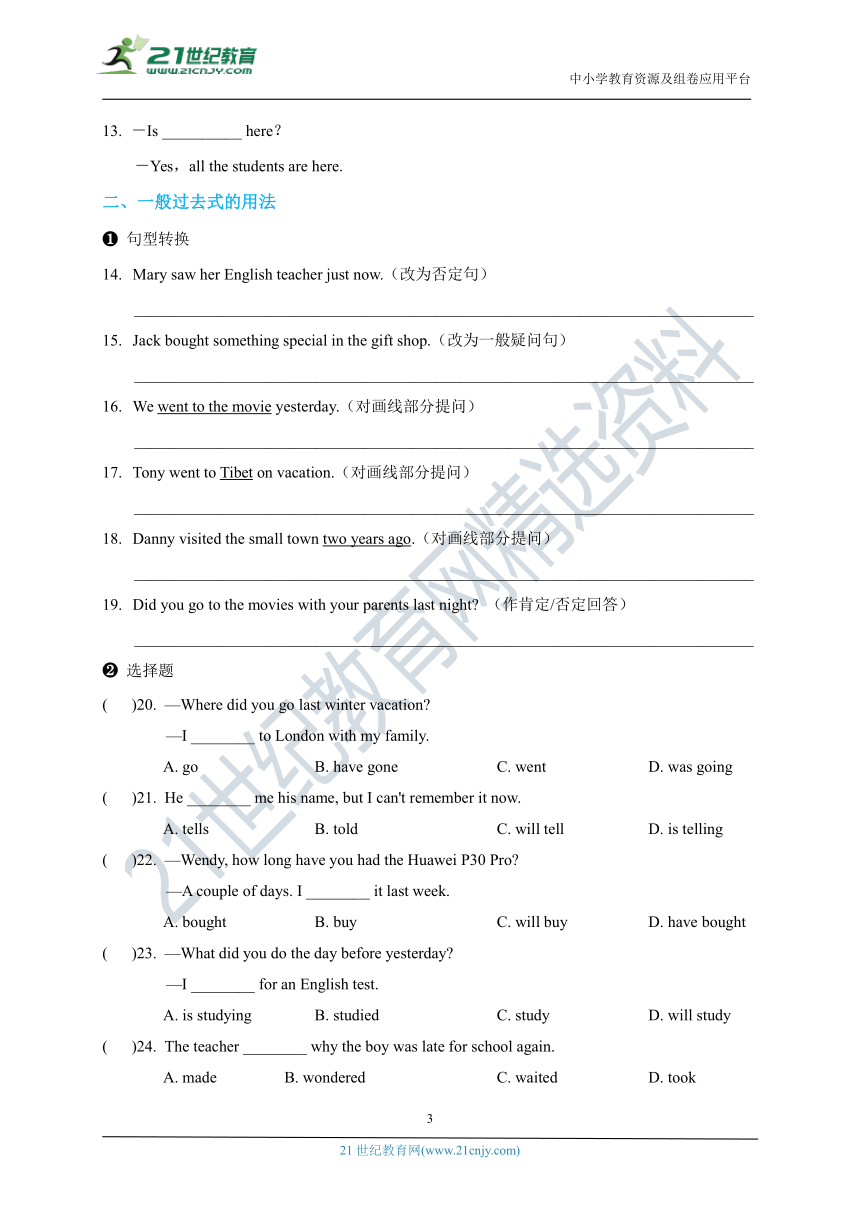
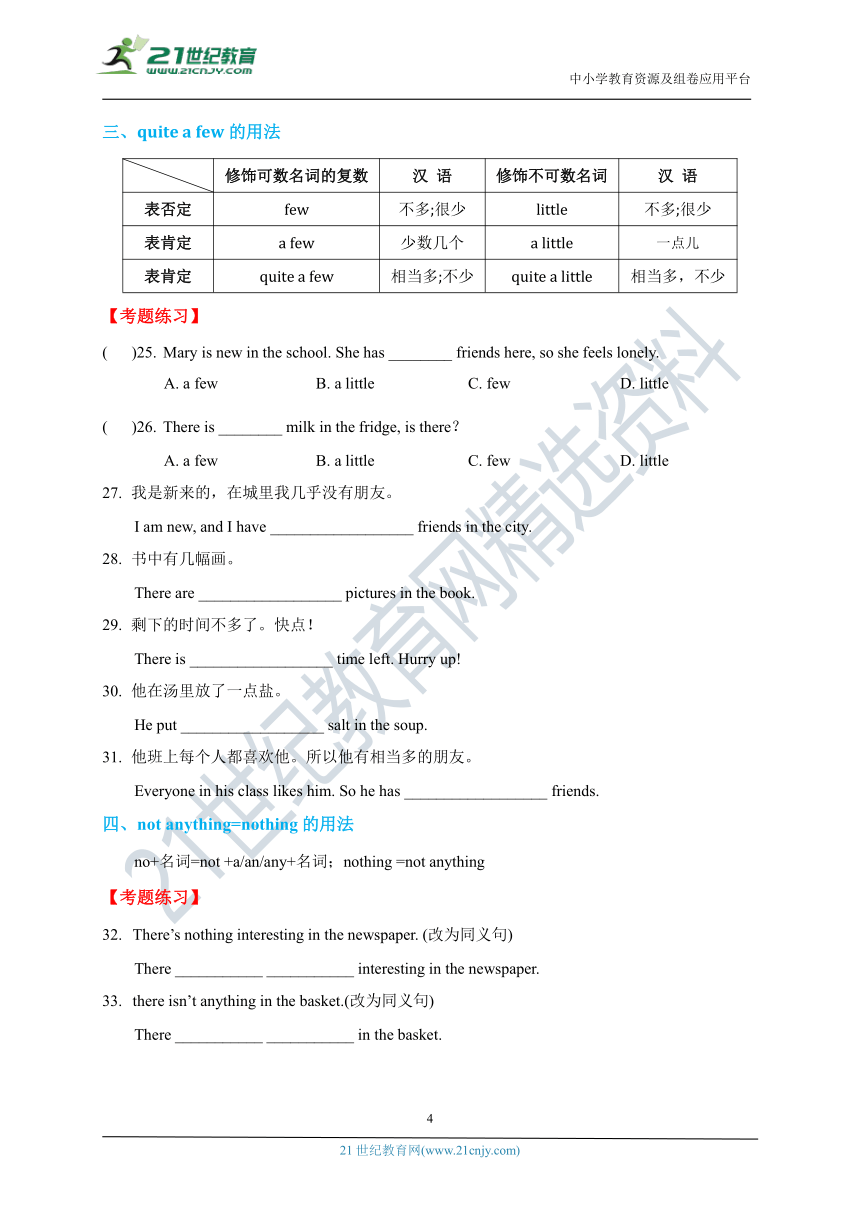
文档简介
Unit
1
Where
did
you
go
on
vacation?
Section
A
一、
复合不定代词的用法
1
二、
一般过去式的用法
3
三、
quite
a
few的用法
4
四、
not
anything=nothing的用法
4
五、
have
a
good
time的用法
5
六、
How
do
you
like……的用法
5
七、
反身代词的用法
5
八、
-ing形式和-ed形式形容词的用法
7
九、
on
vacation的用法
8
十、
seem的用法
8
中小学教育资源及组卷应用平台
21世纪教育网
www.21cnjy.com
精品试卷·第
2
页
(共
2
页)
21世纪教育网(www.21cnjy.com)
Unit
1
Where
did
you
go
on
vacation?
Section
A
复合不定代词的用法
some
any
no
every
复合不定代词
thing
something
anything
nothing
everything
body
somebody
anybody
nobody
everybody
one
someone
anyone
no
one
everyone
复合不定副词
where
somewhere
anywhere
nowhere
everywhere
复合不定代词只相当于名词,在句子中可作主语、宾语、表语,不能作定语(即不具有形容词的性质)。
?
含-body和-one的复合不定代词只用来代替人,在功能和意义上完全相同,可以互换。
eg:Someone/Somebody
is
crying
in
the
next
room.有人在隔壁房间里哭。
?
含-thing的复合不定代词只用来指事物。
eg:Are
you
going
to
buy
anything?
你打算去买东西吗?
复合不定代词都作单数看待,如果充当主语时,谓语动词用单数形式。
eg:Is
everyone
here
today?
今天大家都到齐了吗?
Nothing
is
difficult
if
you
put
your
heart
into
it.世上无难事,只怕有心人。
形容词修饰复合不定代词时,要放在复合不定代词的后面。
eg:Can
you
tell
something
interesting?
你能讲一些有趣的事情吗?
Did
you
go
anywhere
interesting
last
weekend?上周末你去什么有趣的地方了
和some,any用法一样,含有-some的复合不定代词一般用于肯定句和请求语气的句子中,含有-any的复合不定代词一般用于否定句、疑问句。
eg:I
have
something
important
to
tell
you.
我有一些重要的事要告诉你。
Do
you
have
anything
to
say?
你有话要说吗?
在表示请求、邀请、提建议等的疑问句和希望得到对方肯定答复的疑问句中,也可用含-some的复合不定代词。
eg:Would
you
like
something
to
eat?
你想要吃的东西吗?(表示建议)
Could
you
tell
me
something
about
her?
你能告诉我一些关于她的事吗?(表示请求)
Why
don’t
you
ask
someone
to
help
you?
你为什么不请人帮你呢?(表示反问)
含有any的复合不定代词也可以用于肯定句中,表示“任何人”或“任何事”的意思。
eg:Anything
is
OK.
什么都行。
Anybody
knows
the
answer.
任何人都知道答案。
【考题练习】
?
选择题
I’m
hungry.
I
want
________
to
eat.
A.
anything
B.
something
C.
everything
D.
nothing
—Do
you
have
________
to
say
for
yourself?
—No,
I
have
________
to
say.
A.
something;
everything
B.
nothing;
something
C.
everything;
anything
D.
anything;
nothing
Why
not
ask
________
to
help
you?
A.
everyone
B.
someone
C.
anyone
D.
none
Everything
________
ready.
We
can
start
now.
A.
Are
B.
is
C.
be
D.
were
There’s
________
with
his
eyes.
He’s
OK.
A.
anything
wrong
B.
wrong
something
C.
nothing
wrong
D.
wrong
nothing
She
listened
carefully,
but
heard
________.
A.
anyone
B.
something
C.
everyone
D.
nothing
I
agree
with
most
of
what
you
said,
but
I
don’t
agree
with
________.
A.
everything
B.
anything
C.
something
D.
nothing
Everything
________
good.
A.
be
B.
are
C.
is
D.
were
?
用适当的复合不定代词填空
Listen,
__________
is
singing
next
door.
She
didn’t
go
there
with
__________
last
week.
Would
you
like
__________
to
eat?
Come
here!
I
have
__________
important
to
tell
you.
-Is
__________
here?
-Yes,all
the
students
are
here.
一般过去式的用法
?
句型转换
Mary
saw
her
English
teacher
just
now.(改为否定句)
______________________________________________________________________________
Jack
bought
something
special
in
the
gift
shop.(改为一般疑问句)
______________________________________________________________________________
We
went
to
the
movie
yesterday.(对画线部分提问)
______________________________________________________________________________
Tony
went
to
Tibet
on
vacation.(对画线部分提问)
______________________________________________________________________________
Danny
visited
the
small
town
two
years
ago.(对画线部分提问)
______________________________________________________________________________
Did
you
go
to
the
movies
with
your
parents
last
night?
(作肯定/否定回答)
______________________________________________________________________________
?
选择题
—Where
did
you
go
last
winter
vacation?
—I
________
to
London
with
my
family.
A.
go
B.
have
gone
C.
went
D.
was
going
He
________
me
his
name,
but
I
can't
remember
it
now.
A.
tells
B.
told
C.
will
tell
D.
is
telling
—Wendy,
how
long
have
you
had
the
Huawei
P30
Pro?
—A
couple
of
days.
I
________
it
last
week.
A.
bought
B.
buy
C.
will
buy
D.
have
bought
—What
did
you
do
the
day
before
yesterday?
—I
________
for
an
English
test.
A.
is
studying
B.
studied
C.
study
D.
will
study
The
teacher
________
why
the
boy
was
late
for
school
again.
A.
made
B.
wondered
C.
waited
D.
took
quite
a
few的用法
修饰可数名词的复数
汉
语
修饰不可数名词
汉
语
表否定
few
不多;很少
little
不多;很少
表肯定
a
few
少数几个
a
little
一点儿
表肯定
quite
a
few
相当多;不少
quite
a
little
相当多,不少
【考题练习】
Mary
is
new
in
the
school.
She
has
________
friends
here,
so
she
feels
lonely.
A.
a
few
B.
a
little
C.
few
D.
little
There
is
________
milk
in
the
fridge,
is
there?
A.
a
few
B.
a
little
C.
few
D.
little
我是新来的,在城里我几乎没有朋友。
I
am
new,
and
I
have
__________________
friends
in
the
city.
书中有几幅画。
There
are
__________________
pictures
in
the
book.
剩下的时间不多了。快点!
There
is
__________________
time
left.
Hurry
up!
他在汤里放了一点盐。
He
put
__________________
salt
in
the
soup.
他班上每个人都喜欢他。所以他有相当多的朋友。
Everyone
in
his
class
likes
him.
So
he
has
__________________
friends.
not
anything=nothing的用法
no+名词=not
+a/an/any+名词;nothing
=not
anything
【考题练习】
There’s
nothing
interesting
in
the
newspaper.
(改为同义句)
There
___________
___________
interesting
in
the
newspaper.
there
isn’t
anything
in
the
basket.(改为同义句)
There
___________
___________
in
the
basket.
have
a
good
time的用法
have
a
good
time意为“玩得开心;过得愉快”,后接动词形式为:“(in)doing
sth.”
同义词组:have
a
great
time=have
fun=enjoy
oneself=have
a
good
time=have
a
nice
time
【考题练习】
I
had
a
good
time__________
basketball
last
night.
A.
play
B.
to
play
C.
playing
D.
played
I
had
a
good
time
in
London
last
week.
(改为4个不同的同义句)
I
_________________________________
in
London
last
week.
I
_________________________________
in
London
last
week.
I
_________________________________
in
London
last
week.
I
_________________________________
in
London
last
week.
How
do
you
like……的用法
How
do
you
like……?
意为“你认为……怎么样”,与“How
do
you
feel
about……?”和“What
do
you
think
of……?”同义。
eg:—How
do
you
like
the
TV
play?
你觉得这部电视剧怎么样?
—It's
wonderful.
很棒。
【考题练习】
How
do
you
like
the
trousers?
(改为同义句)
How
do
you
_________
_________
trousers?
What
do
you
_________
_________
trousers?
反身代词的用法
单数
汉语
复数
汉语
第一人称
myself
我自己
ourselves
我们自己
第二人称
yourself
你自己
yourselves
你们自己
第三人称
himself
他自己
themselves
他们自己
herself
她自己
她们自己
itself
它自己
它们自己
反身代词多用于动词或介词后做宾语;强调“某人自己”;反身代词应与自己的逻辑主语在人称和数上保持一致。
eg:The
child
can
dress
himself.
这孩子能自己穿衣服了。
I
teach
myself
English.
我自学英语。
I
finished
the
work
by
myself.
我一个人完成了这项工作。
固定搭配:help
oneself
(to
sth.)
随便吃/喝(某物);dress
oneself
某人自己穿衣服;enjoy
oneself玩得开心,过得愉快;by
oneself单独,独自;speak
to
oneself自言自语;
eg:Jim,help
yourself
to
some
cakes.
吉姆,请随便吃点蛋糕。
My
son
is
now
able
to
dress
himself.
我儿子现在会自己穿衣服了。
【考题练习】
Those
girls
enjoyed
________
in
the
party
last
night.
A.
them
B.
they
C.
themselves
D.
herself
Help
________
to
some
fish,
children.
A.
yourself
B.
your
C.
yours
D.
yourselves
The
film
________
is
very
fun.
A.
it’s
B.
itself
C.
it
D.
its
—Who
teaches
________
math?
—I
teach
________.
A.
your,
myself
B.
you,
myself
C.
you,
me
D.
you,
herself
The
father
will
make
________
a
bike
________.
A.
her,
himself
B.
she,
himself
C.
her,
herself
D.
she,
herself
The
scarf
is
________,
she
made
it
________.
A.
herself,
her
B.
herself,
hers
C.
hers,
herself
D.
her,
herself
Liu
Hulan’s
death
was
great.
She
thought
more
of
others
than
________.
A.
her
B.
she
C.
hers
D.
herself
Luckily,
he
didn’t
hurt
________
terribly
yesterday.
A.
him
B.
themselves
C.
himself
D.
they
I
can’t
mend
my
shoe
________.
Can
you
mend
it
for
________
?
A.
myself,
me
B.
myself,
I
C.
me,
I
D.
I,
me
I
like
watching
________
in
the
mirror.
A.
me
B.
I
C.
my
D.
myself
-ing形式和-ed形式形容词的用法
动词-ing和动词–ed形式作形容词,常用来表示“特征”和“状态”。-ed形式的形容词,一般用来描述人的情感,表示“某人感到……的”,主语通常是人。-ing形式的形容词,一般用来形容事或物本身具有的性质,也可表示情境、人或事物让人具有的某种感觉,表示“令人……的”,主语通常是物或人,作定语时,既可修饰人,也可修饰物。
interesting
有趣的
interested
感兴趣的
exciting
令人兴奋的
excited
激动的
surprising
令人惊奇的
surprised
惊奇的
tiring
令人厌倦的
tired
疲劳的
disappointing
令人失望的
disappointed
失望的
pleasing
令人高兴的
pleased
高兴的
satisfying
令人满意的
satisfied
满意的
worrying
令人担心的
worried
担心的
frightening
令人害怕的;恐怖的
frightened
受惊的
boring
令人厌烦的
bored
无聊的;无趣的
embarrassing
令人尴尬的;令人难堪的
embarrassed
尴尬的;难堪的
relaxing令人放松的
relaxed放松的
eg:I’m
interested
in
interesting
people.
我对有趣的人感兴趣。
They
were
excited
about
the
exciting
news.
他们对这个令人兴奋的消息很兴奋。
I’m
bored
with
what
he
said.
我对他说的话厌烦极了。
I
find
the
story
very
boring.
我发现这个故事很无聊。
【考题练习】
Don’t
be
________
about
tomorrow’
test.
I
believe
you
will
pass
it.
A.
pleased
B.
excited
C.
tired
D.
worried
taking
a
deep
breath
before
the
speech
can
keep
you
________.
A.
relaxed
B.
bored
C.
moved
D.
scared
the
movie
is
so
________
that
he
falls
asleep
quickly.
A.
boring
B.
surprising
C.
satisfying
D.
exciting
—Did
you
watch
the
first
match
of
the
Russian
world
Cup?
—of
course!
We
were
so
________
to
watch
the
________
match.
A.
exciting;excited
B.
excited;excited
C.
exciting;exciting
D.
excited;exciting
He
is
__________
(interest)
in
this
book.
It
helps
him
learn
more
about
history.
on
vacation的用法
on
vacation意为“在度假”,vacation是名词,意为“假期;休假”,常与介词on连用,“on+名词”结构可表示“在某种活状态”,如:on
duty(在值日)
on
sale(在出售)
★
vacation,
holiday都表示工作日以外的休息时间(但不包括周末或仅一天的休息
日),也指旅游度假;vacation多用于美式英语,holiday多用于英式英语。
eg:My
dad
is
on
vacation
in
Beijing
now.
【考题练习】
上个月你去哪里度假了?
______________________________________________________________________________
我和我爸爸现在在三亚度假。
______________________________________________________________________________
seem的用法
?
“seem
(
+
to
be)
+名词/形容词”意为“看起来……,好像……”,说明主语的特征或状态,to
be可省略,其中seem作连系动词,意为“好像;似乎;看起来”。
eg:He
seemed
(to
be)
angry.
他似乎生气了
He
seems
(to
be)
quite
happy.她好象十分快乐。
Tom
seems
(to
be
)
a
very
clever
boy.
汤姆看上去是一个非常聪明的男孩。
?
“主语+
seem
+
不定式”,此句型中的seem与不定式一起构成复合谓语。
eg:The
children
seemed
to
be
eating
something
in
the
room.
孩子们好像正在房间里吃东西.
The
young
man
seemed
to
have
changed
much.
这个年轻人看起来变化很大。
?“It
seems
+
that从句”,其中it
是形式主语,that引导主语从句。
eg:It
seems
that
no
one
knows
what
has
happened
in
the
park.
似乎没有人知道在公园里发生了什么事。
It
seems
to
me
that
Mr
Brown
will
not
come
again.
在我看来布朗先生不会再来了。
【考题练习】
She
seemed
quite
__________
(happy)
today.
Because
she
has
received
a
letter
from
her
best
friend
this
morning.
The
math
problem
seems
__________
(be)
very
difficult
to
work
out.
After
a
long
walk,
he
__________
(seem)
very
tired
and
fall
asleep
quickly.
It
__________
that
Lucy
is
very
excited
today.
Because
she
keeps
laughing
all
the
lime.(盲填)
He
begins
to
pack
up.
It
seems
__________
he
wants
to
go
home.(盲填)
It
seems
as
__________
it
is
going
to
rain.
Let’s
take
an
umbrella.(盲填)
参
考
答
案
B
D
B
B
C
D
A
C
someone/somebody
anyone
something
something
everyone/everybody
Mary
didn't
see
her
English
teacher
just
now.
Did
Jack
buy
anything
special
in
the
gift
shop?
What
did
you
do
yesterday?
Where
did
Tony
go
on
vacation?
When
did
Danny
visit
the
small
town?
Yes,
I
did
/
No,
I
didn't
C
B
A
B
B
C
D
few
a
few
little
a
little
quite
a
few
isn’t
anything
is
nothing
C
enjoyed
myself/had
a
nice
time/have
a
great
time/had
fun
feel
about/think
of
C
D
B
A
A
C
D
C
A
D
D
A
A
D
interested
Where
did
you
go
on
vacation
last
month?
My
father
and
I
are
on
vacation
in
Sanya
now.
happy
to
be
seemed
seems
that
if
21世纪教育网(www.21cnjy.com)
1
Where
did
you
go
on
vacation?
Section
A
一、
复合不定代词的用法
1
二、
一般过去式的用法
3
三、
quite
a
few的用法
4
四、
not
anything=nothing的用法
4
五、
have
a
good
time的用法
5
六、
How
do
you
like……的用法
5
七、
反身代词的用法
5
八、
-ing形式和-ed形式形容词的用法
7
九、
on
vacation的用法
8
十、
seem的用法
8
中小学教育资源及组卷应用平台
21世纪教育网
www.21cnjy.com
精品试卷·第
2
页
(共
2
页)
21世纪教育网(www.21cnjy.com)
Unit
1
Where
did
you
go
on
vacation?
Section
A
复合不定代词的用法
some
any
no
every
复合不定代词
thing
something
anything
nothing
everything
body
somebody
anybody
nobody
everybody
one
someone
anyone
no
one
everyone
复合不定副词
where
somewhere
anywhere
nowhere
everywhere
复合不定代词只相当于名词,在句子中可作主语、宾语、表语,不能作定语(即不具有形容词的性质)。
?
含-body和-one的复合不定代词只用来代替人,在功能和意义上完全相同,可以互换。
eg:Someone/Somebody
is
crying
in
the
next
room.有人在隔壁房间里哭。
?
含-thing的复合不定代词只用来指事物。
eg:Are
you
going
to
buy
anything?
你打算去买东西吗?
复合不定代词都作单数看待,如果充当主语时,谓语动词用单数形式。
eg:Is
everyone
here
today?
今天大家都到齐了吗?
Nothing
is
difficult
if
you
put
your
heart
into
it.世上无难事,只怕有心人。
形容词修饰复合不定代词时,要放在复合不定代词的后面。
eg:Can
you
tell
something
interesting?
你能讲一些有趣的事情吗?
Did
you
go
anywhere
interesting
last
weekend?上周末你去什么有趣的地方了
和some,any用法一样,含有-some的复合不定代词一般用于肯定句和请求语气的句子中,含有-any的复合不定代词一般用于否定句、疑问句。
eg:I
have
something
important
to
tell
you.
我有一些重要的事要告诉你。
Do
you
have
anything
to
say?
你有话要说吗?
在表示请求、邀请、提建议等的疑问句和希望得到对方肯定答复的疑问句中,也可用含-some的复合不定代词。
eg:Would
you
like
something
to
eat?
你想要吃的东西吗?(表示建议)
Could
you
tell
me
something
about
her?
你能告诉我一些关于她的事吗?(表示请求)
Why
don’t
you
ask
someone
to
help
you?
你为什么不请人帮你呢?(表示反问)
含有any的复合不定代词也可以用于肯定句中,表示“任何人”或“任何事”的意思。
eg:Anything
is
OK.
什么都行。
Anybody
knows
the
answer.
任何人都知道答案。
【考题练习】
?
选择题
I’m
hungry.
I
want
________
to
eat.
A.
anything
B.
something
C.
everything
D.
nothing
—Do
you
have
________
to
say
for
yourself?
—No,
I
have
________
to
say.
A.
something;
everything
B.
nothing;
something
C.
everything;
anything
D.
anything;
nothing
Why
not
ask
________
to
help
you?
A.
everyone
B.
someone
C.
anyone
D.
none
Everything
________
ready.
We
can
start
now.
A.
Are
B.
is
C.
be
D.
were
There’s
________
with
his
eyes.
He’s
OK.
A.
anything
wrong
B.
wrong
something
C.
nothing
wrong
D.
wrong
nothing
She
listened
carefully,
but
heard
________.
A.
anyone
B.
something
C.
everyone
D.
nothing
I
agree
with
most
of
what
you
said,
but
I
don’t
agree
with
________.
A.
everything
B.
anything
C.
something
D.
nothing
Everything
________
good.
A.
be
B.
are
C.
is
D.
were
?
用适当的复合不定代词填空
Listen,
__________
is
singing
next
door.
She
didn’t
go
there
with
__________
last
week.
Would
you
like
__________
to
eat?
Come
here!
I
have
__________
important
to
tell
you.
-Is
__________
here?
-Yes,all
the
students
are
here.
一般过去式的用法
?
句型转换
Mary
saw
her
English
teacher
just
now.(改为否定句)
______________________________________________________________________________
Jack
bought
something
special
in
the
gift
shop.(改为一般疑问句)
______________________________________________________________________________
We
went
to
the
movie
yesterday.(对画线部分提问)
______________________________________________________________________________
Tony
went
to
Tibet
on
vacation.(对画线部分提问)
______________________________________________________________________________
Danny
visited
the
small
town
two
years
ago.(对画线部分提问)
______________________________________________________________________________
Did
you
go
to
the
movies
with
your
parents
last
night?
(作肯定/否定回答)
______________________________________________________________________________
?
选择题
—Where
did
you
go
last
winter
vacation?
—I
________
to
London
with
my
family.
A.
go
B.
have
gone
C.
went
D.
was
going
He
________
me
his
name,
but
I
can't
remember
it
now.
A.
tells
B.
told
C.
will
tell
D.
is
telling
—Wendy,
how
long
have
you
had
the
Huawei
P30
Pro?
—A
couple
of
days.
I
________
it
last
week.
A.
bought
B.
buy
C.
will
buy
D.
have
bought
—What
did
you
do
the
day
before
yesterday?
—I
________
for
an
English
test.
A.
is
studying
B.
studied
C.
study
D.
will
study
The
teacher
________
why
the
boy
was
late
for
school
again.
A.
made
B.
wondered
C.
waited
D.
took
quite
a
few的用法
修饰可数名词的复数
汉
语
修饰不可数名词
汉
语
表否定
few
不多;很少
little
不多;很少
表肯定
a
few
少数几个
a
little
一点儿
表肯定
quite
a
few
相当多;不少
quite
a
little
相当多,不少
【考题练习】
Mary
is
new
in
the
school.
She
has
________
friends
here,
so
she
feels
lonely.
A.
a
few
B.
a
little
C.
few
D.
little
There
is
________
milk
in
the
fridge,
is
there?
A.
a
few
B.
a
little
C.
few
D.
little
我是新来的,在城里我几乎没有朋友。
I
am
new,
and
I
have
__________________
friends
in
the
city.
书中有几幅画。
There
are
__________________
pictures
in
the
book.
剩下的时间不多了。快点!
There
is
__________________
time
left.
Hurry
up!
他在汤里放了一点盐。
He
put
__________________
salt
in
the
soup.
他班上每个人都喜欢他。所以他有相当多的朋友。
Everyone
in
his
class
likes
him.
So
he
has
__________________
friends.
not
anything=nothing的用法
no+名词=not
+a/an/any+名词;nothing
=not
anything
【考题练习】
There’s
nothing
interesting
in
the
newspaper.
(改为同义句)
There
___________
___________
interesting
in
the
newspaper.
there
isn’t
anything
in
the
basket.(改为同义句)
There
___________
___________
in
the
basket.
have
a
good
time的用法
have
a
good
time意为“玩得开心;过得愉快”,后接动词形式为:“(in)doing
sth.”
同义词组:have
a
great
time=have
fun=enjoy
oneself=have
a
good
time=have
a
nice
time
【考题练习】
I
had
a
good
time__________
basketball
last
night.
A.
play
B.
to
play
C.
playing
D.
played
I
had
a
good
time
in
London
last
week.
(改为4个不同的同义句)
I
_________________________________
in
London
last
week.
I
_________________________________
in
London
last
week.
I
_________________________________
in
London
last
week.
I
_________________________________
in
London
last
week.
How
do
you
like……的用法
How
do
you
like……?
意为“你认为……怎么样”,与“How
do
you
feel
about……?”和“What
do
you
think
of……?”同义。
eg:—How
do
you
like
the
TV
play?
你觉得这部电视剧怎么样?
—It's
wonderful.
很棒。
【考题练习】
How
do
you
like
the
trousers?
(改为同义句)
How
do
you
_________
_________
trousers?
What
do
you
_________
_________
trousers?
反身代词的用法
单数
汉语
复数
汉语
第一人称
myself
我自己
ourselves
我们自己
第二人称
yourself
你自己
yourselves
你们自己
第三人称
himself
他自己
themselves
他们自己
herself
她自己
她们自己
itself
它自己
它们自己
反身代词多用于动词或介词后做宾语;强调“某人自己”;反身代词应与自己的逻辑主语在人称和数上保持一致。
eg:The
child
can
dress
himself.
这孩子能自己穿衣服了。
I
teach
myself
English.
我自学英语。
I
finished
the
work
by
myself.
我一个人完成了这项工作。
固定搭配:help
oneself
(to
sth.)
随便吃/喝(某物);dress
oneself
某人自己穿衣服;enjoy
oneself玩得开心,过得愉快;by
oneself单独,独自;speak
to
oneself自言自语;
eg:Jim,help
yourself
to
some
cakes.
吉姆,请随便吃点蛋糕。
My
son
is
now
able
to
dress
himself.
我儿子现在会自己穿衣服了。
【考题练习】
Those
girls
enjoyed
________
in
the
party
last
night.
A.
them
B.
they
C.
themselves
D.
herself
Help
________
to
some
fish,
children.
A.
yourself
B.
your
C.
yours
D.
yourselves
The
film
________
is
very
fun.
A.
it’s
B.
itself
C.
it
D.
its
—Who
teaches
________
math?
—I
teach
________.
A.
your,
myself
B.
you,
myself
C.
you,
me
D.
you,
herself
The
father
will
make
________
a
bike
________.
A.
her,
himself
B.
she,
himself
C.
her,
herself
D.
she,
herself
The
scarf
is
________,
she
made
it
________.
A.
herself,
her
B.
herself,
hers
C.
hers,
herself
D.
her,
herself
Liu
Hulan’s
death
was
great.
She
thought
more
of
others
than
________.
A.
her
B.
she
C.
hers
D.
herself
Luckily,
he
didn’t
hurt
________
terribly
yesterday.
A.
him
B.
themselves
C.
himself
D.
they
I
can’t
mend
my
shoe
________.
Can
you
mend
it
for
________
?
A.
myself,
me
B.
myself,
I
C.
me,
I
D.
I,
me
I
like
watching
________
in
the
mirror.
A.
me
B.
I
C.
my
D.
myself
-ing形式和-ed形式形容词的用法
动词-ing和动词–ed形式作形容词,常用来表示“特征”和“状态”。-ed形式的形容词,一般用来描述人的情感,表示“某人感到……的”,主语通常是人。-ing形式的形容词,一般用来形容事或物本身具有的性质,也可表示情境、人或事物让人具有的某种感觉,表示“令人……的”,主语通常是物或人,作定语时,既可修饰人,也可修饰物。
interesting
有趣的
interested
感兴趣的
exciting
令人兴奋的
excited
激动的
surprising
令人惊奇的
surprised
惊奇的
tiring
令人厌倦的
tired
疲劳的
disappointing
令人失望的
disappointed
失望的
pleasing
令人高兴的
pleased
高兴的
satisfying
令人满意的
satisfied
满意的
worrying
令人担心的
worried
担心的
frightening
令人害怕的;恐怖的
frightened
受惊的
boring
令人厌烦的
bored
无聊的;无趣的
embarrassing
令人尴尬的;令人难堪的
embarrassed
尴尬的;难堪的
relaxing令人放松的
relaxed放松的
eg:I’m
interested
in
interesting
people.
我对有趣的人感兴趣。
They
were
excited
about
the
exciting
news.
他们对这个令人兴奋的消息很兴奋。
I’m
bored
with
what
he
said.
我对他说的话厌烦极了。
I
find
the
story
very
boring.
我发现这个故事很无聊。
【考题练习】
Don’t
be
________
about
tomorrow’
test.
I
believe
you
will
pass
it.
A.
pleased
B.
excited
C.
tired
D.
worried
taking
a
deep
breath
before
the
speech
can
keep
you
________.
A.
relaxed
B.
bored
C.
moved
D.
scared
the
movie
is
so
________
that
he
falls
asleep
quickly.
A.
boring
B.
surprising
C.
satisfying
D.
exciting
—Did
you
watch
the
first
match
of
the
Russian
world
Cup?
—of
course!
We
were
so
________
to
watch
the
________
match.
A.
exciting;excited
B.
excited;excited
C.
exciting;exciting
D.
excited;exciting
He
is
__________
(interest)
in
this
book.
It
helps
him
learn
more
about
history.
on
vacation的用法
on
vacation意为“在度假”,vacation是名词,意为“假期;休假”,常与介词on连用,“on+名词”结构可表示“在某种活状态”,如:on
duty(在值日)
on
sale(在出售)
★
vacation,
holiday都表示工作日以外的休息时间(但不包括周末或仅一天的休息
日),也指旅游度假;vacation多用于美式英语,holiday多用于英式英语。
eg:My
dad
is
on
vacation
in
Beijing
now.
【考题练习】
上个月你去哪里度假了?
______________________________________________________________________________
我和我爸爸现在在三亚度假。
______________________________________________________________________________
seem的用法
?
“seem
(
+
to
be)
+名词/形容词”意为“看起来……,好像……”,说明主语的特征或状态,to
be可省略,其中seem作连系动词,意为“好像;似乎;看起来”。
eg:He
seemed
(to
be)
angry.
他似乎生气了
He
seems
(to
be)
quite
happy.她好象十分快乐。
Tom
seems
(to
be
)
a
very
clever
boy.
汤姆看上去是一个非常聪明的男孩。
?
“主语+
seem
+
不定式”,此句型中的seem与不定式一起构成复合谓语。
eg:The
children
seemed
to
be
eating
something
in
the
room.
孩子们好像正在房间里吃东西.
The
young
man
seemed
to
have
changed
much.
这个年轻人看起来变化很大。
?“It
seems
+
that从句”,其中it
是形式主语,that引导主语从句。
eg:It
seems
that
no
one
knows
what
has
happened
in
the
park.
似乎没有人知道在公园里发生了什么事。
It
seems
to
me
that
Mr
Brown
will
not
come
again.
在我看来布朗先生不会再来了。
【考题练习】
She
seemed
quite
__________
(happy)
today.
Because
she
has
received
a
letter
from
her
best
friend
this
morning.
The
math
problem
seems
__________
(be)
very
difficult
to
work
out.
After
a
long
walk,
he
__________
(seem)
very
tired
and
fall
asleep
quickly.
It
__________
that
Lucy
is
very
excited
today.
Because
she
keeps
laughing
all
the
lime.(盲填)
He
begins
to
pack
up.
It
seems
__________
he
wants
to
go
home.(盲填)
It
seems
as
__________
it
is
going
to
rain.
Let’s
take
an
umbrella.(盲填)
参
考
答
案
B
D
B
B
C
D
A
C
someone/somebody
anyone
something
something
everyone/everybody
Mary
didn't
see
her
English
teacher
just
now.
Did
Jack
buy
anything
special
in
the
gift
shop?
What
did
you
do
yesterday?
Where
did
Tony
go
on
vacation?
When
did
Danny
visit
the
small
town?
Yes,
I
did
/
No,
I
didn't
C
B
A
B
B
C
D
few
a
few
little
a
little
quite
a
few
isn’t
anything
is
nothing
C
enjoyed
myself/had
a
nice
time/have
a
great
time/had
fun
feel
about/think
of
C
D
B
A
A
C
D
C
A
D
D
A
A
D
interested
Where
did
you
go
on
vacation
last
month?
My
father
and
I
are
on
vacation
in
Sanya
now.
happy
to
be
seemed
seems
that
if
21世纪教育网(www.21cnjy.com)
同课章节目录
- Unit 1 Where did you go on vacation?
- Section A
- Section B
- Unit 2 How often do you exercise?
- Section A
- Section B
- Unit 3 I'm more outgoing than my sister.
- Section A
- Section B
- Unit 4 What's the best movie theater?
- Section A
- Section B
- Unit 5 Do you want to watch a game show?
- Section A
- Section B
- Unit 6 I'm going to study computer science.
- Section A
- Section B
- Unit 7 Will people have robots?
- Section A
- Section B
- Unit 8 How do you make a banana milk shake?
- Section A
- Section B
- Unit 9 Can you come to my party?
- Section A
- Section B
- Unit 10 If you go to the party, you'll have a grea
- Section A
- Section B
